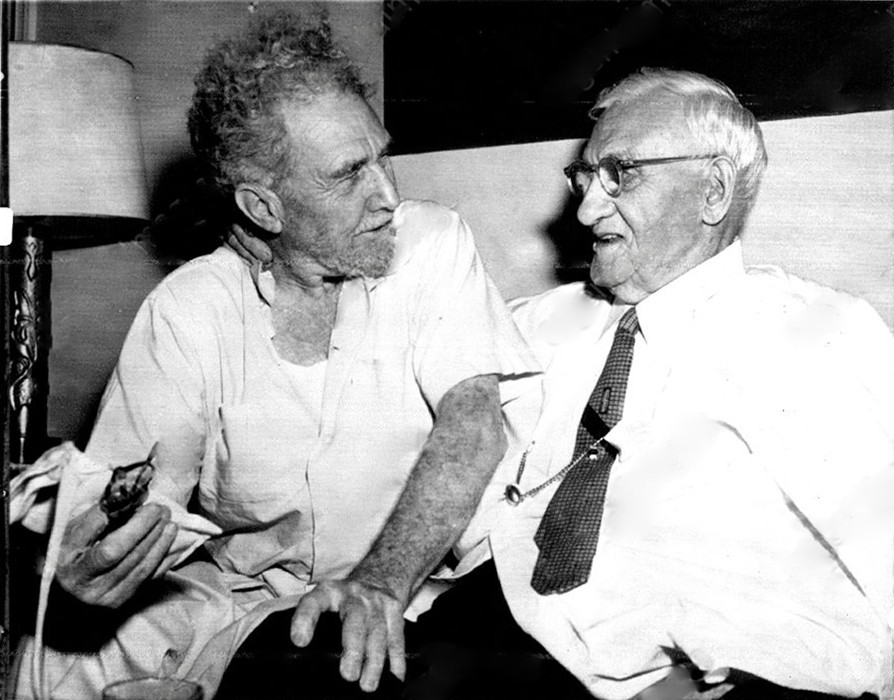Yes, Ezra Pound is worth reading. He founded a literary movement known as Imagism which had enormous impact on the world of poetry, he wrote widely celebrated poetry himself, and he edited and published some of the most beloved works in the Western canon.
Who Was Ezra Pound?
Ezra Weston Loomis Pound (1885-1972) was, and remains a deeply controversial figure. He was an American poet and critic (who lived mostly overseas), and was influential in the Modernist poetry movement.
He was anti-semetic and unfortunately a fascist collaborator during WW2. He produced many paid broadcasts which attacked the United States, and was arrested at the end of WW2 by the Americans and charged with treason.
He escaped the worst consequences of this crime as he was institutionalized on the basis of poor mental health.
Despite this his epic poem, The Cantos, was awarded the Bollingen Prize for Poetry in 1949 by the Library of Congress.
Understandably, this caused controversy.
So. Why do we read and talk about this guy at all, right?
Well, his influence on Western literature is utterly enormous. In several ways.
Firstly, his work is admired on its own merits. The movement called Imagism which he pioneered was widely celebrated. Hemingway said that writers in the 20th Century couldn’t help being influenced by him.
Secondly, he may be responsible for publishing some of the greatest literature of the 20th Century … when you hear the following sentence you may want to sit down and catch your breath.
He serialized James Joyce’s A Portrait of the Artist as a Young Man, and Joyce’s Ulysses, and published Eliot’s The Love Song of J. Alfred Prufrock.
Basically, he changed Western literature forever.
What Did Ezra Pound Write?
It is arguable that Pound is remembered more for the literary movement he started called Imagism and for publishing and editing the works of other writers, than for his own writing.
However, his highly celebrated works include The Cantos, In a Station of the Metro, The Return, The Seafarer, and Hugh Selwyn Mauberley.
Here’s the entirety of In a Station of the Metro, to whet your appetite for Imagist poetry.
THE APPARITION of these faces in the crowd;
Petals on a wet, black bough.
Was Ezra Pound Anti-semitic? Should We Read Pound Today?
Yes, unfortunately there are passages in Pound’s work that suggest he may have been anti-semitic. And fascist. This raises many questions for modern readers.
His friends in later life tried to convince the world that his alleged anti-semitism and fascist leanings were the consequence of poor mental health.
Should we enjoy his work, and celebrate his literary achievements?
This problem does not have a simple answer. The safe option is probably to acknowledge his influence and contributions and leave it at that, which is the posture adopted by most of polite society these days.
While the evil forces that he allegedly championed, such as European fascism, are still threatening us today, it may simply be too risky to heap further laurels upon Pound, lest his ideas inflame bad people to do bad things.
The further we get historically from writers with questionable views, the less of a threat they pose (arguably). For instance, a lot of Plato’s positions share similarities with fascism, but because we are so removed temporally, we don’t think of his ideas as particularly dangerous. This may be the case with Pound in years to come.
For now, we should remain cautious about reading and teaching Pound.

Are The Cantos of Ezra Pound Worth Reading?
Yes, The Cantos is worth reading. However, it is a challenging read. To begin with, it is very long. Secondly, the allusions are very wide ranging, and some will likely need to be researched by the reader to be understood. Thirdly, there are Chinese characters, and other languages too!

